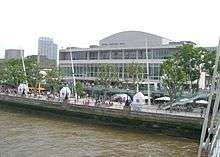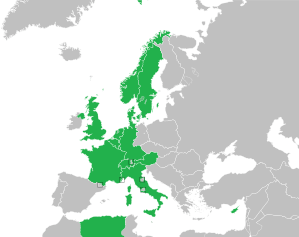Eurovision Song Contest 1960
The Eurovision Song Contest 1960 was the fifth edition of the annual Eurovision Song Contest. It took place in London, United Kingdom and was held at the Royal Festival Hall on Tuesday 29 March 1960. The show was hosted by Catherine Boyle (later Katie Boyle). It was the first Eurovision Song Contest held in a capital city, as well as in the British Isles and in the English-speaking world.
| Eurovision Song Contest 1960 | |
|---|---|
| Dates | |
| Final | 29 March 1960 |
| Host | |
| Venue | Royal Festival Hall London, United Kingdom |
| Presenter(s) | Katie Boyle |
| Conductor | Eric Robinson |
| Directed by | Innes Lloyd |
| Host broadcaster | British Broadcasting Corporation (BBC) |
| Interval act | Eric Robinson's Orchestra[1] |
| Website | eurovision |
| Participants | |
| Number of entries | 13 |
| Debuting countries | |
| Returning countries | |
| Non-returning countries | None |
Participation map
| |
| Vote | |
| Voting system | Each country had 10 jury members who each cast one vote for their favorite song. |
| Nul points | None |
| Winning song | "Tom Pillibi" |
Following Teddy Scholten's win for the Netherlands at the 1959 contest in Cannes, France with the song "Een beetje", the Netherlands Television Foundation declined to host another contest so soon after staging the event in 1958. The honour of hosting the contest therefore passed to the United Kingdom, which had come second in 1959.
Thirteen countries participated in the contest. Norway made their début, and Luxembourg returned after their absence from the previous edition.
The winner was France with the song "Tom Pillibi", performed by Jacqueline Boyer, written by Pierre Cour, and composed by André Popp. This was France's second victory in the contest, following their win in 1958, and their fourth consecutive top three placing.[1] Aged 18, Boyer became the first teenager and the youngest artist yet to win the contest.[2]
Location

The 1960 Eurovision Song Contest was hosted in London. The Royal Festival Hall, the venue for the 1960 contest, is a 2,900-seat concert, dance and talks venue within Southbank Centre in London. It is situated on the South Bank of the River Thames, not far from Hungerford Bridge.[3]
The result was a win for France, however Germany, Monaco and the UK led in the early stages of voting. The UK came second with 25 points, four more points than the winning song in 1959, and Monaco came third on 15 points making up for their disappointing début result the year before.[1]
Participating countries
Interest in the contest started to grow across Europe, with the number of participating nations increasing to 13 this year. Norway made its debut with one of their leading jazz singers. Luxembourg returned to the contest after a one-year break with a song in native Luxembourgish language.[1] The Netherlands was mistakenly announced as Holland (which is only the western part of the country of The Netherlands).
Conductors
The conductors of the orchestra for each country's performance were:[4][5]




.svg.png)








Results
| Draw | Country | Artist | Song | Language[6] | Place | Points |
|---|---|---|---|---|---|---|
| 01 | Bryan Johnson | "Looking High, High, High" | English | 2 | 25 | |
| 02 | Siw Malmkvist | "Alla andra får varann" | Swedish | 10 | 4 | |
| 03 | Camillo Felgen | "So laang we's du do bast" | Luxembourgish | 13 | 1 | |
| 04 | Katy Bødtger | "Det var en yndig tid" | Danish | 10 | 4 | |
| 05 | Fud Leclerc | "Mon amour pour toi" | French | 6 | 9 | |
| 06 | Nora Brockstedt | "Voi Voi"1 | Norwegian | 4 | 11 | |
| 07 | Harry Winter | "Du hast mich so fasziniert" | German | 7 | 6 | |
| 08 | François Deguelt | "Ce soir-là" | French | 3 | 15 | |
| 09 | Anita Traversi | "Cielo e terra" | Italian | 8 | 5 | |
| 10 | Rudi Carrell | "Wat een geluk" | Dutch | 12 | 2 | |
| 11 | Wyn Hoop | "Bonne nuit ma chérie" | German | 4 | 11 | |
| 12 | Renato Rascel | "Romantica" | Italian | 8 | 5 | |
| 13 | Jacqueline Boyer | "Tom Pillibi" | French | 1 | 32 |
Scoreboard
Each country had 10 jury members who each cast one vote for their favorite song.
| Voting results | |||||||||||||||
|---|---|---|---|---|---|---|---|---|---|---|---|---|---|---|---|
| United Kingdom | 25 | 2 | 1 | 5 | 4 | 1 | 3 | 2 | 1 | 5 | 1 | ||||
| Sweden | 4 | 2 | 1 | 1 | |||||||||||
| Luxembourg | 1 | 1 | |||||||||||||
| Denmark | 4 | 2 | 1 | 1 | |||||||||||
| Belgium | 9 | 3 | 1 | 1 | 4 | ||||||||||
| Norway | 11 | 1 | 1 | 4 | 1 | 1 | 2 | 1 | |||||||
| Austria | 6 | 1 | 1 | 2 | 2 | ||||||||||
| Monaco | 15 | 3 | 7 | 1 | 2 | 1 | 1 | ||||||||
| Switzerland | 5 | 1 | 2 | 1 | 1 | ||||||||||
| Netherlands | 2 | 1 | 1 | ||||||||||||
| Germany | 11 | 4 | 2 | 2 | 2 | 1 | |||||||||
| Italy | 5 | 1 | 2 | 1 | 1 | ||||||||||
| France | 32 | 1 | 2 | 1 | 5 | 1 | 5 | 3 | 4 | 1 | 4 | 5 | |||
Broadcasters, commentators and spokespersons
Spokespersons
Listed below is the order in which votes were cast during the 1960 contest along with the spokesperson who was responsible for announcing the votes for their respective country.[7]








.svg.png)




Broadcasters and commentators
Each national broadcaster also sent a commentator to the contest, in order to provide coverage of the contest in their own native language.
| Country | Broadcaster(s) | Commentator(s) | Ref(s) | |
|---|---|---|---|---|
| Participating countries | ||||
| ORF | Wolf Mittler | [7] | ||
| INR | French: Georges Désir | [7][5] | ||
| NIR | Dutch: Nic Bal | [7][5] | ||
| Danmarks Radio TV | Sejr Volmer-Sørensen | [7][5] | ||
| RTF | Pierre Tchernia | [7][5] | ||
| Deutsches Fernsehen | Wolf Mittler | [7][5][9] | ||
| Programma Nazionale | Giorgio Porro | [7][5] | ||
| Télé-Luxembourg | Pierre Tchernia | [7] | ||
| Télé Monte Carlo | [7] | |||
| NTS | Piet te Nuyl | [7][5][10] | ||
| NRK and NRK P1 | Erik Diesen | [7][5] | ||
| Sveriges TV and SR P2 | Jan Gabrielsson | [7][11] | ||
| TV DRS | German: Theodor Haller | [7][5][9] | ||
| BBC Television Service | David Jacobs | [7][5] | ||
| BBC Light Programme | Pete Murray | |||
| Non-participating countries | ||||
| Suomen Televisio | Aarno Walli | [7] | ||
Notes and references
Notes
- ^ Although the song was performed in Norwegian, the title and sentence in the lyrics "Voi Voi" is in Northern Sami.
References
- "Eurovision History - London 1960". European Broadcasting Union. Retrieved 5 March 2012.
- O'Connor, John Kennedy. The Eurovision Song Contest - The Official Celebration. Carlton Books, 2015. ISBN 978-1-78097-638-9. Pages 32-33
- "About the Southbank Centre". RFH.co.uk. Southbank Centre. Archived from the original on 10 December 2005. Retrieved 12 June 2012.
- "And the conductor is..." Retrieved 10 July 2018.
- Roxburgh, Gordon (2012). Songs for Europe: The United Kingdom at the Eurovision Song Contest. Volume One: The 1950s and 1960s. Prestatyn: Telos Publishing. pp. 214–224. ISBN 978-1-84583-065-6.
- "Eurovision Song Contest 1960". The Diggiloo Thrush. Retrieved 4 March 2012.
- "Eurovision 1960 - Cast and Crew". IMDb. Retrieved 17 July 2020.
- "Toch geen geluk voor Rudi", Nieuwe Leidsche Courant, 30 March 1960
- "Programm vom Dienstag, den 29. März 1960". Programm vom Dienstag, den 29. März 1960s (in German).
- "Nederlandse televisiecommentatoren bij het Eurovisie Songfestival". Eurovision Artists (in Dutch).
- Thorsson, Leif (2006). Melodifestivalen genom tiderna ["Melodifestivalen through time"]. Stockholm: Premium Publishing AB. p. 26. ISBN 91-89136-29-2.
External links
| Wikimedia Commons has media related to Eurovision Song Contest 1960. |

